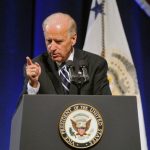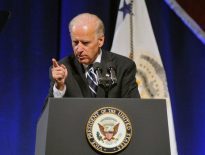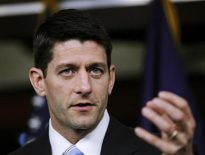Romney has a potent issue in the
pivotal state’s ailing economy, but Obama has a huge head start in the ground game.
West, Washington Bureau
winning the White House than
Florida, and no issue here is more important than the economy.
That dynamic played out recently when Vice President Joe
Biden came to the perennial electoral vote battleground to promote the Obama administration’s environmental record by
riding an airboat through the Everglades.
r
The Romney camp responded with a stinging assault on President Obama’s “failed” economic policies. The targets: a Florida
jobless rate that exceeds the national average, painfully high gasoline prices, rising healthcare costs and one of the worst
housing collapses in the country. The environment wasn’t even mentioned.
“The tough economic climate in Florida is
like a giant anchor around Obama’s ankles,” said Florida strategist Alberto Martinez, a senior Romney campaign
advisor.
Long a powerful magnet for Northern retirees and tourist hordes from around the world, Florida is an economic
laggard this election year, which helps explain why Obama chose to begin his reelection campaign instead in Ohio and
Virginia, two other must-wins for Romney, which are faring better economically than Florida.
From the sultry
Latin-infused tip of the peninsula to the pine woods panhandle that juts into Dixie, deserted storefronts and empty
commercial buildings languish across the state. Weeds choke the abandoned streets and vacant lots of so-called zombie
subdivisions, remnants of a speculative bubble that continues to depress the housing market and voters’ mood. In Tampa, where Romney
and his running mate will be crowned at this summer’s nominating convention, home prices just hit another new
low.
Jobs are coming back. But in a familiar pattern, they don’t always match those lost in the recession. Last
month, more than 3,300 applicants showed up for 400 new positions at the Seminole Hard Rock Hotel & Casino in Tampa, many
of them low-paying service jobs.
“We’re starting to see seeds of recovery, but it’s way late and way slower than it
should have been,” said Martinez, the Romney advisor.
Obama planted his flag in the nation’s fourth-most populous
state years ago and never left. As president, he’s been a frequent visitor, making two trips last month. His campaign has
opened more than a dozen Florida offices, including a bustling storefront down the street from the Republican-controlled
Capitol in Tallahassee. If both sides engage fully, total campaign spending in the state could reach $150 million.
In
2008, Obama carried Florida by 2.8 percentage points, well below his national popular vote margin, in what was “a perfect
environment” for him, according to Steven Schale, who ran the state campaign that year.
“Because our economy is so
dependent on other people spending money, when Americans have money, our booms last longer. And when they don’t, our busts
take longer to get out of,” said Schale, an informal reelection advisor. “There’s not a damn thing the president can do to
change that.”
Recent public opinion surveys give Romney a statistically insignificant lead in the state and show that
Florida voters view him more favorably than those in other big swing states. That may reflect the estimated $18 million that
the Romney forces spent to win the Florida primary, a pivotal fight in the nomination campaign.
Organizationally,
though, Romney is playing catch-up. His entire Florida team was dispatched to other states after the January victory and is
just now reassembling.
“Obama was opening up storefronts all over the state, while the Republican candidates were
duking it out in places that don’t matter in the general election,” said another Romney advisor in Florida, requesting
anonymity to speak candidly about the campaign. “If you injected me with sodium pentothal and asked me what one thing bothers
me most, it’s what the Obama campaign has done at the ground level.”
But sharp restrictions on new voter
registration, imposed last year by the Republican-led Legislature, have slowed Obama’s efforts to expand the electorate to
make up for those who have soured on him. And even Democratic strategists say Romney’s team has enough time to put together
a successful statewide operation.
One potential wild card: Sen. Marco Rubio, a charismatic Cuban
American and leading vice presidential contender. He could help with the state’s Latinos, about 15% of the electorate, and
possibly tip the state to the Republicans.
Ro
mney is also trying to cut Obama’s support among Jewish voters, about 5% of the electorate, by highlighting the
administration’s rocky relations with Israel.
Obama, in turn, is wooing independents, including suburban women turned
off by Romney’s attacks on Planned Parenthood and his
decision to side with conservatives in the debate over healthcare coverage for contraceptive services. Democrats are also
targeting affluent, socially moderate coastal residents who place a high value on a pristine environment.
Romney’s
campaign is working daily to keep the state’s woes front and center. His chief strategist, Stuart Stevens, is one of several
aides with Florida experience (he advised former Gov. Charlie Crist, who later left the
GOP and became an independent — the fastest-growing slice of the state’s 11.3-million voter pool). Since last year, the
campaign has pushed Florida-themed Web ads that feature scenes from a Miami-area job fair for minorities.
The “Obama
Isn’t Working” attacks inadvertently trace a trend that could complicate Romney’s effort: an improving employment picture —
from a jobless rate of 10.7%, highlighted in a video in September, to 9.4% in one released last month. The rate has since
dropped to 9%, compared with 8.1% nationally.
But voter opinion often lags statistical trends, a boon for Romney even
if the job picture brightens. The last president defeated for reelection, Ge
orge H.W. Bush in 1992, lost in part because voters hadn’t yet felt that the economy was growing.
In Florida,
many economically sensitive swing voters, the sort who decide close elections, haven’t discerned progress in their lives
over the last four years.
“Jobs have not improved,” said Ben Drawdy, 33, a Lutz, Fla., salesman. “For working-class
voters, it’s not a good situation for us.”
The registered Republican voted for Obama last time but backs Romney now.
He recently joined a focus group of 12 Floridians, assembled by the University of Pennsylvania’s Annenberg Public Policy
Center, who sharply criticized Romney yet indicated, in overwhelming numbers, that they would vote for him anyway.
In
an interview, Drawdy said he was “absolutely” concerned about a clean environment. But he dismissed Biden’s recent
Everglades stop as a political stunt designed to distract attention from “bigger issues” like the economy, retirement
security and gasoline prices.
Four years ago, Obama “just blew me away. He sold me on a lot of things that he didn’t
deliver. He said he’d stimulate the economy with jobs and make healthcare affordable, and it really has not been the case,”
he said. “People can’t pay their bills.”

![Obama vs. Romney in Florida [Republican presidential candidate, former
Massachusetts Gov. Mitt Romney, speaks during a campaign event at Exhibit Edge, May 2, 2012 in Chantilly, Virginia. (Olivier
Douliery/Abaca Press/MCT)] *** [] ** HOY OUT, TCN OUT **](https://www.yoopya.com/ymedia/uploads/2012/05/romney3.jpg)




